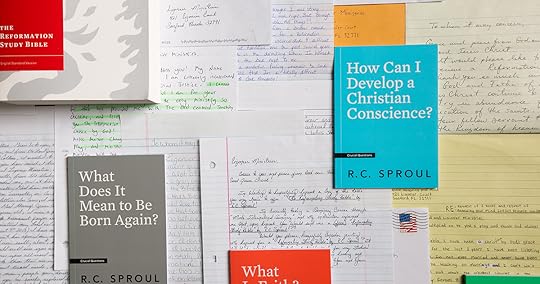R.C. Sproul's Blog, page 42
December 10, 2020
$5 Friday (And More): Spiritual Growth, Justification, & Worship

It’s time for our weekly $5 Friday sale. This week’s resources include such topics as spiritual growth, justification, worship, scripture, preaching, John Calvin, and more.
Plus, several bonus resources are also available for more than $5. These have been significantly discounted from their original price. This week’s bonus resources include:
Essential Truths of the Christian Faith by R.C. Sproul, Paperback $16 $10
Getting the Blues: What Blues Music Teaches Us about Suffering and Salvation by Stephen Nichols, Paperback $20 $14
Give Praise to God: A Vision for Reforming Worship , Paperback $25 $15
Glory to the Holy One by R.C. Sproul, CD $15 $8
The God We Worship with R.C. Sproul, DVD $30 $15
God’s Technology with David Murray, DVD $15 $10
The Hard Sayings of the Bible with R.C. Sproul, CD $38 $12
A Little Book on the Christian Life by John Calvin, CD $18 $10
And More
Sale runs through 12:01 a.m.–11:59 p.m. Friday ET.
View today’s $5 Friday sale items.


Trustworthy Teaching Is Needed Now More Than Ever

You may have seen these words I wrote to some of our ministry friends back in January: Sound theology is practical theology, informing every step of the Christian walk.
True then, and more evidently true now. This year has demonstrated with crystal clarity how essential right theology is for faithful Christian living. Your year-end gift of any amount will make it possible to meet our December budget need and continue distributing right theology around the world.
Amid the ups and downs of the COVID-19 health crisis, economic turmoil, and political upheaval, Christians rest in the sovereignty of God. Dr. R.C. Sproul and the generations of faithful pastors and theologians who have come before us often reminded the church that the Lord is in control and He will build His church, comforting and protecting His people in tumultuous times. We cling to the true, life-giving message of His sovereignty, goodness, and holiness. Ligonier Ministries has proclaimed God’s truth in 2020. In fact, we’ve reached more people than ever before, even in this difficult year.
Give thanks to God with us. In the Lord’s timing, our increased reach is particularly fitting as we press into 2021. We are weeks away from beginning Ligonier’s fiftieth year of ministry.
Your support is so vital. The vision in front of us is urgent and global. Now, through your support and with God’s blessing, we’ll move forward. I’m sure you recognize how Ligonier’s discipleship resources are needed now more than ever. Our biennial State of Theology survey and other research is showing that large numbers of professing evangelicals in the United States and around the world are confused on essential matters such as the deity of Christ. The need for solid biblical teaching is vast, and Ligonier is working to meet this need, enabled by your prayers and donations.
You are amazingly generous people. Thank you. What a gracious journey we’re on together as God uses each of us for His glory. In 2020:
You enabled the completion of Ligonier’s on-campus studio, making it possible, due to COVID-19 restrictions, to transition our 2020 National Conference to an online event that reached more than one hundred thousand people around the world.
You gave us the confidence to make our entire video library free to stream during the many stay-at-home orders around the world. As a result, time spent on Ligonier.org doubled, and video views on Ligonier’s YouTube channel tripled.
You provided the needed resources for Reformation Bible College to offer its Foundation Year certificate online for the first time.
Your support launched the Ask Ligonier and Luther: In Real Time podcasts. You also underwrote the production of a new podcast from Dr. Sproul launching in January.
You helped publish the Spanish edition of the Reformation Study Bible.
You advanced the milestone work on Ligonier’s Chinese-language website.
You bolstered the production of new teaching series and books, including the release of Dr. Sproul’s commentary on Luke’s gospel and A Field Guide on False Teaching .
You are making it possible to release the first wave of upgrades to Ligonier.org early in 2021. We’ve developed a world-class teaching platform to properly preserve Dr. Sproul’s years of teaching, deliver Ligonier’s deep content library to people around the world, and foster encounters with the holiness of God among the nations. We anticipate the ministry engagement we’re seeing on Ligonier.org to grow expansively.
There’s so much more to be done, and 2020 has reminded us of how much we rely on your support. The funds we must raise in December to meet our ministry budget are significant. The Lord uses donors like you to bridge the gap between need and outreach, vision and action. With nearly eight billion souls on earth, the need is great. By praying for and supporting Ligonier as we begin the next fifty years of ministry, you help ensure that the truth that encourages you and helps inform the steps of your Christian walk can be made available to millions more people in more languages next year—and perhaps even billions in the decades to follow. Thank you.


The People of Christ
Here’s an excerpt from The People of Christ, Brandon Crowe's contribution to the December issue of Tabletalk:
When Jesus drew near to His final hour on the cross, having already loved His disciples who were in the world, “he loved them to the end” (John 13:1). This begins John’s narration of the events surrounding the last evening of Jesus’ earthly life, when Jesus washes His disciples’ feet and teaches them about His cleansing (vv. 1–20), encourages them about His impending departure (13:31–16:33), and then prays what is often known as His High Priestly Prayer (17:1–26). It is remarkable that Jesus does not cease to shepherd His disciples even as He faces His own death and the grueling prospect of bearing the wrath of God against sin.
Continue reading The People of Christ, or begin receiving Tabletalk magazine by signing up for a free 3-month trial.
For a limited time, the new TabletalkMagazine.com allows everyone to browse and read the growing library of back issues, including this month’s issue.


December 9, 2020
The God of Peace
In the Bible, peace is more than the absence of hostility. From his teaching series Blessing and Praise, H.B. Charles Jr. describes what it means to belong to the God of peace.
Transcript:
What is peace? It is more than the absence of hostility and animosity and trouble. It is more than the absence of negative realities. The idea of peace in the Bible is wholeness and completeness and blessing and fulfillment. When, in the Old Testament, one would say to another, "Peace be with you," he is not saying merely, "I hope you don't get into a fight today." It is a positive statement of blessing. May God's help and strength and favor be yours. Peace be with you. The question is where does this peace come from? That's the emphasis here. He is saying that true peace comes only from God. God is the God of peace. Where there is God, there is peace. Where there is true peace, there is God. God is the source of peace. God is the substance of peace. God is the sustainer of peace. God is the supply of peace. Isaiah 26:3: "You will keep him in perfect peace whose mind is stayed on you because he trusts in you." The one who runs to the cross and trusts the Lord Jesus Christ for salvation is a beneficiary of peace with God says Romans 5:1. "Having been justified by faith, we now have peace with God through our Lord Jesus Christ." Sin makes us enemies of God but the blood of the righteousness of Christ brings peace with God. But not only does the Christian have peace with God, he has access to the peace of God. Philippians chapter 4:6–7 says, "Be anxious for nothing, but in everything by prayer and supplication with thanksgiving let your requests be made known to God. And the peace of God, which surpasses all understanding, will guard your heart and mind through Christ Jesus." John Blanchard commented there that the peace of God is being grateful for past mercy, conscious of present mercy, and certain of future mercy. God is the God of peace.


Core Convictions about Prayer

To experience God in our midst we must be people of prayer. To be people of prayer we need to know what prayer is. From the example of David in Psalm 109, we can see that prayer is the total offering of oneself to God for everything that is needed. Because of this people of prayer affirm several core convictions.
God invites us to pray.
Through the psalmist the Lord invites us, saying, “Pour out your hearts before him” (Ps. 62:8). When he walked this earth our Lord showed that he invites us to pray, saying three times in his teaching on prayer, “When you pray,” and then he said, “Pray then like this” (Matt. 6:5, 6, 7, 9). Clearly, God desires and delights in our prayers.
God is able and available to hear our prayers.
David knew the pain of abandonment. Yet he can say of the Lord, “He stands at the right hand of the needy one” (Ps. 109:31). The right hand of God is the place of power and honor; it is the place where our Lord Jesus currently stands. But here we are told that God stands next to us, at our right hand, ready to advocate for us! Even before we ask or think, God has the power to do above and beyond all that we will ask or think in a superabundant way (Eph. 3:20–21). How? The same power that raised Christ is the same power at work in us to raise us from sin to salvation (1:20–21). In the words of Thomas Manton, “Faith sets prayer a-work, and prayer sets the almighty power of God a-work.” “It is much for the glory of God’s goodness, and the encouragement of ours, that He is a God hearing prayer.”
God promises to answer our prayers.
The Lord promised through Isaiah, “The Lord will answer . . . He will say, ‘Here I am’” (Is. 58:9). God is not only available to hear prayer but also to answer. We see this in relating the beginning of Psalm 109 with the end. In verse 4, David prays, and then, in verse 31, he is reassured that God is right at his side, in his struggles, in his prayers. God is near “to save him from those who condemn his soul to death.” God is fully available, being at our right hand. But he is also fully able, being the God who actually saves us from our dire distress. In the words of John Calvin, “There is nothing better to stir us to make our prayers, than a firm assurance that we shall succeed in them.”
God promises to answer our prayers made in accord with his will.
“Whatever you ask in my name, this I will do, that the Father may be glorified in the Son. If you ask me anything in my name, I will do it” (John 14:13–14; cf. 15:16; 16:23–24). The key is that whatever we ask of God must be done “in [Jesus’] name.” D.A. Carson explains that this means our prayers “are offered in thorough accord with all that his name stands for (i.e. his name is not used as a magical incantation: cf. 1 John 5:14), and in recognition that the only approach to God those who pray enjoy, their only way to God (cf. vv. 4–6), is Jesus himself.” The questions we need to be asking are these: am I asking for something that Jesus would pray for? Am I asking for something that will bring glory to the Father? If so, we ask; then we wait.
God grants us the help and intercession of His Holy Spirit when we are at a loss in prayer.
“Likewise the Spirit helps us in our weakness. For we do not know what to pray for as we ought, but the Spirit Himself intercedes for us with groanings too deep for words” (Rom. 8:26).
God promises us His blessings when we pray.
God compares his blessings given through prayer to renewing rain which He grants from heaven. “Put me to the test, says the Lord of hosts, if I will not open the windows of heaven for you and pour down for you a blessing until there is no more need” (Mal. 3:10); “He will come to us as the showers, as the spring rains that water the earth” (Hos. 6:3); “I will be like the dew to Israel; He shall blossom like the lily; He shall take root like the trees of Lebanon” (Hos. 14:5). In the words of Alfred Tennyson’s poem on the death of King Arthur, “More things are wrought by prayer than this world dreams of. Wherefore, let thy voice rise like a fountain for me night and day.
This excerpt is abridged and adapted from Daniel R. Hyde’s chapter “Continuing in Prayer” in Faithful and Fruitful: Essays for Elders and Deacons edited by William Boekestein and Steven Swets
Thomas Manton, “A Treatise of the Life of Faith,” in Works (1870–75; repr., Homewood, AL: Solid Ground Christian Books, 2008), 15:146.
Matthew Henry, Commentary on the Whole Bible (Peabody, MA: Hendrickson Publishers, 8th printing, 1997), 834, col. 2.
John Calvin, A Harmony of the Gospels Matthew, Mark, and Luke: Volume 1, trans. A.W. Morrison, eds. David W. Torrance and Thomas F. Torrance, Calvin’s Commentaries 12 vols. (1972; repr., Grand Rapids: Wm. B. Eerdmans Publishing Company, 1975), 1:229.
D.A. Carson, The Gospel According to John (Grand Rapids: William B. Eerdmans Publishing Company, 1991), 497.
“Morte D’Arthur.” As found at https://www.poetryfoundation.org/poem... (Accessed July 20, 2018).


December 8, 2020
A Letter of Encouragement from the Front Lines

Our military chaplains are on the front lines, bringing the gospel to those who are in spiritual need. For over fifteen years, Ligonier has been serving more than 200 military chaplains around the world through our Military Chaplain Outreach Program. By the financial support of friends such as you, this critical outreach delivers resource packages of books, Bibles, issues of Tabletalk magazine, and more to aid them in their ministry efforts.
Recently, we received an encouraging letter from Chaplain Mark Levine of the U.S. Army Chaplain Center and School in Fort Jackson, S.C.
Dear Chaplain Outreach Donors,
As a recipient of Chaplain Outreach Ministry resource packages for years, I have written emails expressing my thanks for your generous gifts to fund this important ministry. However, I have been remiss in not more formally and properly thanking you for your continued support—not only for me personally—but for all of the military and civilian chaplains to whom you have dedicated your gifts of support.
Perhaps a brief introduction of who I am will help set the context for my letter. I came to faith in Christ as a teenager in 1978 through the ministry of a PCA church outside of Pittsburgh, where my pastor was a seminary classmate of R.C. and thus a student of Dr. John Gerstner. Several times a year, both R.C. and Dr. Gerstner would teach Sunday school and preach in our church. Each summer, several of my friends and I would drive to Stahlstown to hear R.C. and the other teachers at the Ligonier Valley Study Center. Throughout my entire Christian life of now forty-two years, R.C. Sproul and the ministry of Ligonier have been absolutely formative and of significant influence in practically every aspect of my Christian life. I have been a proud Ligonier partner for years.
Since becoming a chaplain in 2002, I have given away loads of materials from Ligonier to soldiers and their families. After I was able to participate in the Chaplain Outreach Ministry, that outreach has exponentially increased, and many individuals have been exposed to the Reformed faith as a result of the generosity of you who have consistently funded this magnificent ministry. Moreover, I personally have continued to benefit from the teaching and daily exposure to Ligonier's teaching ministry. It is impossible to calculate the benefit I and countless others have had from this outreach, enabling me to get solid biblical materials, as well as Reformation Study Bibles, into the hands of people who are either new to the Christian faith or are more mature believers seeking to grow in the grace and knowledge of Christ.
As an Army chaplain, having been stationed all around the country and in Germany twice, along with being sent to Iraq, Afghanistan, and Kuwait on combat deployments, I have not always been able to sit under the ministry of a faithful church. One of the constants, however, along my almost twenty-six year career in the Army (beginning in 1987, with a break in service from 1994–2002), has been the teaching ministry of Ligonier. I am the pastor that I am today in large part due to R.C. and his influence, and an intentional facet of how I seek to win others to Christ and make disciples of them is to use the resources obtained from this crucial ministry that you fund.
Allow me therefore to sincerely thank you for your commitment to me and the many other military and civilian chaplains who have received Ligonier materials over the years. It is an incalculable blessing to receive the DVDs, Bibles, books, and other materials that have been sent. While distributing the materials to others is a key target of this outreach, please know as well that we chaplains have personally grown in Christ and have been substantially spiritually sustained by this ministry. Please do not underestimate the significance of spiritually sustaining us chaplains. We are in a pluralistic environment and often find ourselves in areas without a solid church. We need Ligonier materials to continue to be fed on the Word of God and to be better equipped to serve others in the faith.
May the Lord richly bless you and yours as you have richly blessed us and ours. Thank you once again for your support of us chaplains!
In Christ,
Mark R. Levine
Chaplain (Lieutenant Colonel), U.S. Army
U.S. Army Chaplain Center and School
Fort Jackson, S.C.
This important outreach is only possible thanks to the generous support of friends such as you.
SUPPORT OUR CHAPLAINS


The Person of Christ
Here’s an excerpt from The Person of Christ, Robert J. Cara's contribution to the December issue of Tabletalk:
Properly during the Christmas season, we emphasize Christ’s becoming man (incarnation) and that He is the King. But without denying these appropriate emphases, the Christ of Christmas is fully the Priest (and Prophet) as well as the King.
Continue reading The Person of Christ, or begin receiving Tabletalk magazine by signing up for a free 3-month trial.
For a limited time, the new TabletalkMagazine.com allows everyone to browse and read the growing library of back issues, including this month’s issue.


December 7, 2020
Save 50% on Study Bibles & Commentaries

This week only, save 50% on select editions of the Reformation Study Bible in English and Spanish and all of R.C. Sproul’s expositional commentaries—including the newly released title, Luke. Just in time for Christmas and a new year of Bible study, these resources can let you share the life-giving truth of God’s Word with your family, friends, and church.
Edited by Dr. Sproul and drawing from the wisdom of 75 distinguished theologians, the Reformation Study Bible elevates Scripture on every page by providing comprehensive and trustworthy commentary, accessible to every reader. Dr. Sproul’s expositional commentaries also let you focus on individual books of the Bible, helping you to understand key theological themes and apply them to all areas of your life. Here is your opportunity to save 50% on Bible study resources for yourself or to give as a gift during the holiday season.
Explore this collection of trusted resources before the sale ends on Saturday, December 12, 2020. Order yours today while supplies last.


When God Created the World, Did He Know It Would Be Corrupted by Sin?

When God made the world, did He know that it would be marred by sin? From one of our Ask R.C. events, R.C. Sproul discusses how sin and evil relate to the Lord’s glorious plan for His creation.
If you have a biblical or theological question, just visit ask.Ligonier.org to ask your question live online.
Read the Transcript


Grace-Fueled Obedience Is Absolutely Necessary for Christlikeness

Can you imagine a Christian couple actually praying about living together before marriage? Can you fathom a young woman who professes Christ even bothering to pray about whether she should marry an unbeliever? Can you grasp a Christian businessman having to pray about whether he should tell the truth in a transaction? When the Word of God is so clear, praying to discern God's will becomes a convenient excuse—or even a prolonged filibuster—to avoid doing what Scripture commands.
Many who profess Christ today emphasize a wrong view of grace that makes it a free pass to do whatever they please. Tragically, they have convinced themselves that the Christian life can be lived without any binding obligation to the moral law of God. In this hyper-grace distortion, the need for obedience has been neutered. The commandments of God are no longer in the driver's seat of Christian living, but have been relegated to the backseat, if not the trunk—like a spare tire—to be used only in case of an emergency. With such a spirit of antinomianism, what needs to be reinforced again is the necessity of obedience.
For all true followers of Christ, obedience is never peripheral. At the heart of what it means to be a disciple of our Lord is living in loving devotion to God. But if such love is real, the acid test is obedience. Jesus maintained, "If you love me,you will keep my commandments" (John 14:15). Genuine love for Christ will always manifest itself in obedience.
This does not mean that a Christian can ascend to sinless perfection. This will never be realized this side of glory. Neither does it imply that a believer will never disobey God again. Isolated acts of disobedience will still occur. But the new birth does give a new heart that desires to obey the Word. In regeneration, God says:
And I will give you a new heart, and a new spirit I will put within you. And I will remove the heart of stone from your flesh and give you a heart of flesh. And I will put my Spirit within you, and cause you to walk in my statutes and be careful to obey my rules. (Ezek. 36:26–27)
In this heart transplant, God causes the believer to pursue Spirit-energized obedience. The Apostle John agrees when he writes, "And by this we know that we have come to know him, if we keep his commandments" (1 John 2:3). In the new birth, the elect are granted saving faith, and they immediately begin to walk in "the obedience of faith" (Rom. 1:5). There is no timelapse between the time of conversion and when one begins to obey Christ. The exercise of saving faith is the first step of a life of obedience. When Jesus preached, "Repent and believe in the gospel" (Mark 1:14–15), this was issued as an urgent imperative. The gospel is more than an offer to be considered—it is a word from God to be obeyed. John writes, "Whoever believes in the Son has eternal life; whoever does not obey the Son shall not see life" (John 3:36). In this verse, believing in Christ and obeying Him are used synonymously. Simply put, true faith is obedient faith. Our obedience of faith is not the grounds upon which God declares us righteous, but it reveals our faith to be genuine.
At the moment of conversion, we transfer our allegiance from our old master, sin, to a new Master, Jesus Christ. Paul explains, "Do you not know that if you present yourselves to anyone as obedient slaves, you are slaves of the one whom you obey, either of sin, which leads to death, or of obedience, which leads to righteousness?" (Rom. 6:16). Here, the Apostle quotes a general axiom in life, namely, that slaves live in obedience to their ruling master. In conversion, there is an exchange of masters, a relinquishing of our old bondage to sin for a new loyalty to the Lord Jesus Christ.
Paul further stresses this truth: "You who were once slaves of sin have became obedient from the heart to the standard of teaching to which you were committed, and, having been set free from sin, became slaves of righteousness" (Rom. 6:17–18). Everyone is a slave, either of sin or of righteousness. Before conversion, we were slaves of sin and lived in obedience to sin. But in conversion, we became slaves of Christ and live in obedience to Him.
Throughout one's Christian life, John claims that genuine believers will continue to "keep his commandments." "Keep" is in the present tense, indicating an ongoing obedience throughout the entirety of a believer's life. Here is the perseverance of the saints. All who are born again will pursue obedience to the end. "Commandments" is plural, indicating obedience to the full spectrum of the divine requirements. Following Christ does not allow for selective obedience. Rather, we must obey all the commandments of God, not merely the convenient ones.
When John says believers "keep" the commandments, this pictures a guard or watchman watching over a priceless treasure. In like manner, the one who knows God will keep a sharp watch over all that His Word requires. "And his commandments are not burdensome" (1 John 5:3), but they are a blessing (Ps. 1:1). Every step of heart-prompted obedience leads to experiencing abundant life in Christ. Conversely, every step of disobedience takes us away from the joy of divine goodness.
Far from being optional, grace-fueled obedience is absolutely necessary for Christlikeness. Is there any need to pray about whether or not to obey God's Word? You just need to obey.
This post was originally published in Tabletalk magazine.


R.C. Sproul's Blog
- R.C. Sproul's profile
- 1931 followers



